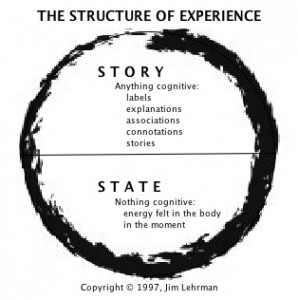 I like to define “experience” as what happens in the space that defines you. It is made up of two components – story and state. You can think of this graphically as a circle with a line going from left to right across the middle. The top half of the circle is “story”. The bottom half is “state”. Story is anything cognitive – labels, explanations, associations, connotations, stories. State is nothing cognitive – it is energy felt in the body in the moment.
I like to define “experience” as what happens in the space that defines you. It is made up of two components – story and state. You can think of this graphically as a circle with a line going from left to right across the middle. The top half of the circle is “story”. The bottom half is “state”. Story is anything cognitive – labels, explanations, associations, connotations, stories. State is nothing cognitive – it is energy felt in the body in the moment.
You can locate yourself outside this circle, such that whatever goes on in this space, in this circle is simply part of the environment. This perspective enables you to be in relationship with your experience rather than lost in it. A certain type of freedom grows out of developing that relationship.
Here’s an exercise that can get you started in developing that relationship. It involves breathing, holding your breath, and paying attention.
Lie down, and breathe in a normal breath, then exhale every bit of air that you can. Then breathe in only half as much as the previous breath. Again, exhale every bit of air you can. With your third breath, again breathe in only half as much air as your previous breath. Exhale everything. Repeat this pattern two more times such that with your fifth exhalation, you have what seems like no air at all left to breath out. With that, do not breathe in a sixth breath. Instead, just hold your breath – or your lack of breath – as long as you can.
While holding this, let your attention go to whatever unfolds in your experience. Notice the voices that resist this insult to your need to survive and notice the voices that might support this experiment in letting go. Notice any argument that ensues between these parts of you. Also notice any pulling in of your chest as well as any pushing out. Notice what happens in your head, in your heart, in your arms, in your gut. Notice any memories or associations. Notice the felt sense of panic, or of peace, or of whatever. Simply notice anything, even any judgment that arises in response to what you notice. Hold your breath only as long as you can without hurting yourself and notice the extent to which you are lost in your experience and the extent to which you are the witness. When you can’t hold your breath any longer, give your biological drive the oxygen it so desires. And even as you suck in air, continue to simply notice what happens in these many domains of your experience.
Try this exercise once – with full attention – then try it again a day or so later. See what changes over time with the strength of your ability to separate from your experience and locate yourself as the witness. May this be the start of a beautiful relationship with yourself.
A word of warning – if you have any reason to be concerned about your heart or other relevant aspects of your physical health, treat this exercise accordingly. Be self-responsible.
Copyright © 2014 Jim Lehrman